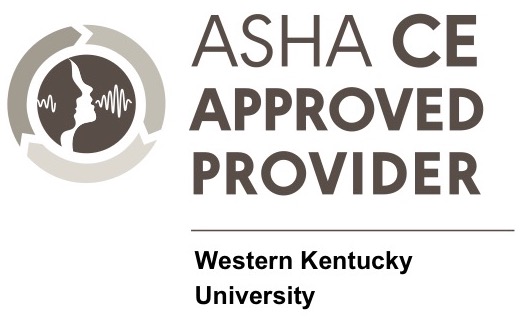Communication Sciences & Disorders
WKU Communication Sciences & Disorders Department presents
2024 South Central Kentucky SLP Network Fall Workshop
Thursday, October 24, 2024: Live Workshop via Zoom
Morning Session: Importance of Using a Workload Model for School-Based SLPs
When caseloads don’t give the full picture (and they rarely do!), looking at a workload model is imperative. Workload models take into account more aspects of the job than caseload rosters and lead to improved outcomes for learners and SLPs alike. This presentation focuses on how one SLP department shifted the mindset for SLPs and administration from looking only at caseloads, to measuring, analyzing, and making real time decisions for workload management on a monthly basis. Participants are then given the opportunity to apply a workload model to their setting
ASHA Course ID: ABBV0053 - Live Workshop
Subject Code: 7010 - Service Delivery Associated With Speech, Language, Hearing, and Related Disorders
|
Workshop Agenda |
|
|---|---|
| 8:00 - 8:10 AM | Introduction/disclosures |
| 8:10 - 8:35 AM |
Caseload/workload definitions |
| 8:35 - 9:00 AM | Identifying problems in your setting |
| 9:00 - 9:30 AM | Review of workload calculator/matrix |
| 9:30 - 9:45 AM | Break |
| 9:45 - 10:30 AM | Long term workload plans and advocacy |
| 10:30 - 10:50 AM | Examining your own workload |
| 10:50 - 11:05 AM | Forming an action plan |
|
11:05 - 11:15 AM |
Wrap up/questions |
Abbie Keibler, M.A., CCC-SLP
Abbie Keibler is a Speech-Language Pathologist at Mississippi Bend AEA in Bettendorf, Iowa. She is a non-traditional SLP graduate with undergraduate degrees in German and Psychology and taught preschool prior to (and during!) the acquisition of her Master of Arts in SLP at Ball State University in Muncie, Indiana. Currently, Abbie is in her 18th year working in the schools where she serves the preschool and elementary population. Abbie is an adjunct instructor at St. Ambrose University in Davenport, Iowa, and has a special interest in comprehensive literacy for complex communicators and AAC. When not “speech-ing,” you’ll find Abbie taxi-ing her children from activity to activity or reading. She reads around 100 fiction books a year as a necessary escape.
Disclosure: The presenter will receive compensation for this presentation. She is a member of ASHA and has no other financial or nonfinancial relationships or conflicts of interest to disclose.
After this course, participations will be able to:
- Identify visual supports that support all learners, including those with complex communication needs.
- Evaluate current learning environments and learning targets (literacy, social engagement, etc.) to design ways to incorporate visual supports and AAC.
- Examine the critical importance of modeling using AAC throughout all routines in order to construct the best outcomes for student learning.
Afternoon Session: Using AAC and AT in the Classroom: Partnering with Educators for Learner Success
SLPs and classroom educators have the unique opportunity to partner for the greater good of their learners, specifically when it comes to assistive technology and augmentative and alternative communication systems. Once knowledge of core vocabulary, choosing robust AAC systems, and modeling is established through a brief review, the presentation will focus on building the environment from a traditional classroom setting to one rich in visual supports, literacy opportunities, and accessibility for all learners. Pictures, videos, and links to existing materials will guide participants through visualizing how to take their AAC work within classrooms to the next level.
ASHA Course ID: ABBV0054 - Live Workshop
Subject Code: 3040 - Augmentative and Alternative Communication (AAC)
|
Workshop Agenda |
|
|---|---|
| 12:00 - 12:05 PM | Welcome/disclosures |
| 12:05 - 12:20 PM |
Common themes and using light tech AAC |
| 12:20 - 12:35 PM | Vocabulary review |
| 12:35 - 12:50 PM | Modeling review and paraprofessional training |
| 12:50 - 1:05 PM | Inclusive classroom settings |
| 1:05 - 1:20 PM | Literacy strategies |
| 1:20 - 1:50 PM | AAC and AT action plan |
| 1:50 - 2:00 PM | Wrap up/questions |
Abbie Keibler, M.A., CCC-SLP
Abbie Keibler is a Speech-Language Pathologist at Mississippi Bend AEA in Bettendorf, Iowa. She is a non-traditional SLP graduate with undergraduate degrees in German and Psychology and taught preschool prior to (and during!) the acquisition of her Master of Arts in SLP at Ball State University in Muncie, Indiana. Currently, Abbie is in her 18th year working in the schools where she serves the preschool and elementary population. Abbie is an adjunct instructor at St. Ambrose University in Davenport, Iowa, and has a special interest in comprehensive literacy for complex communicators and AAC. When not “speech-ing,” you’ll find Abbie taxi-ing her children from activity to activity or reading. She reads around 100 fiction books a year as a necessary escape.
Disclosure: The presenter will receive compensation for this presentation. She is a member of ASHA and has no other financial or nonfinancial relationships or conflicts of interest to disclose.
After this course, participations will be able to:
- Identify visual supports that support all learners, including those with complex communication needs.
- Evaluate current learning environments and learning targets (literacy, social engagement, etc.) to design ways to incorporate visual supports and AAC.
- Examine the critical importance of modeling using AAC throughout all routines in order to construct the best outcomes for student learning.
Register for Live WorkshopsRegistration for the Live Workshop is open through Wednesday, October 23rd. Zoom link for the workshop will be sent out a week prior to the event.
In order to receive ASHA CE credit, you must attend the workshop and complete an evaluation form.

Morning Session:
Intermediate Level
0.30 ASHA CEUs
Professional Content
Afternoon Session:
Intermediate Level
0.20 ASHA CEUs
Professional Content
ASHA CE Provider approval and use of the Brand Block does not imply endorsement of course content, specific products or clinical procedures.
Some of the links on this page may require additional software to view.

